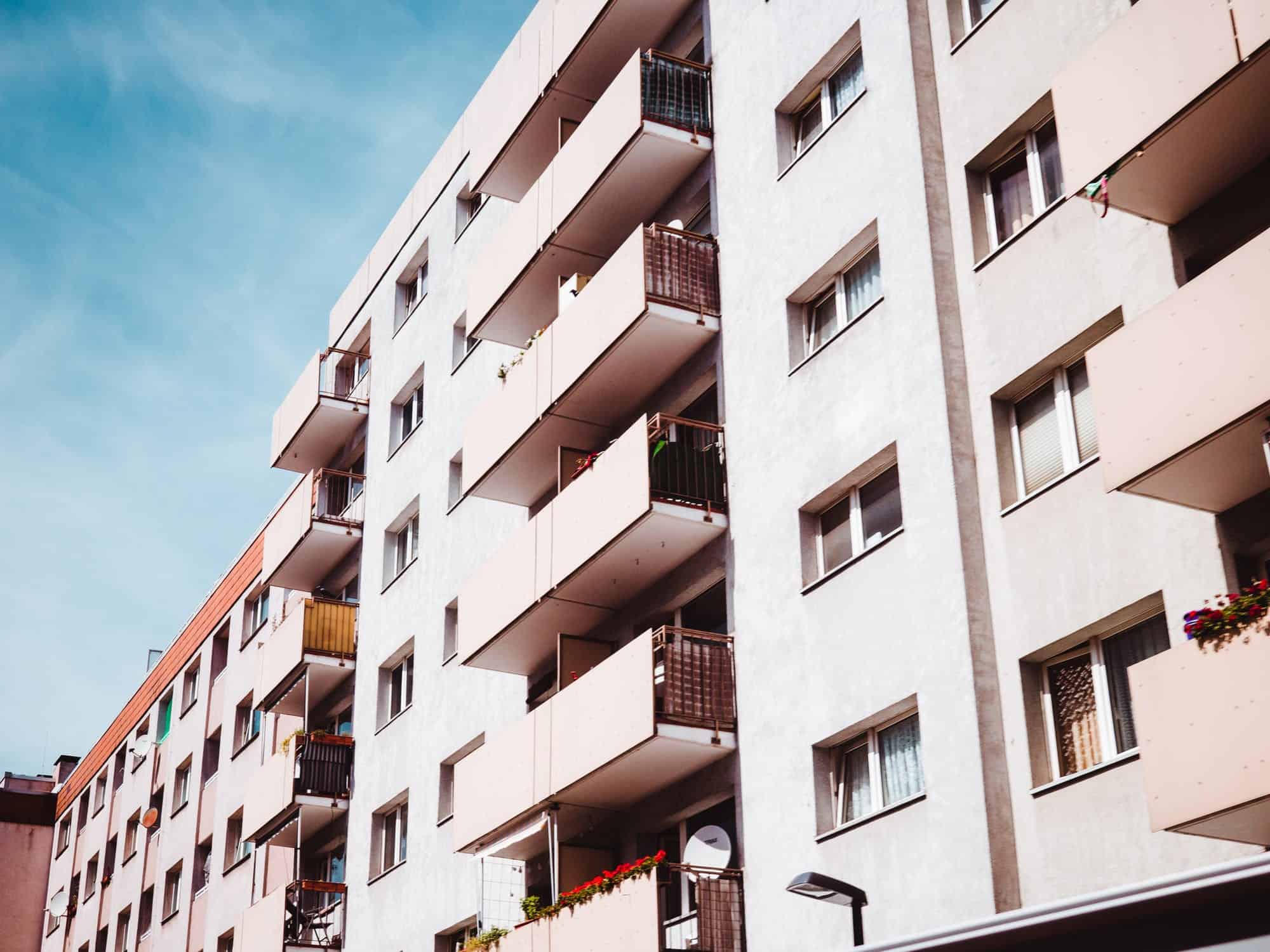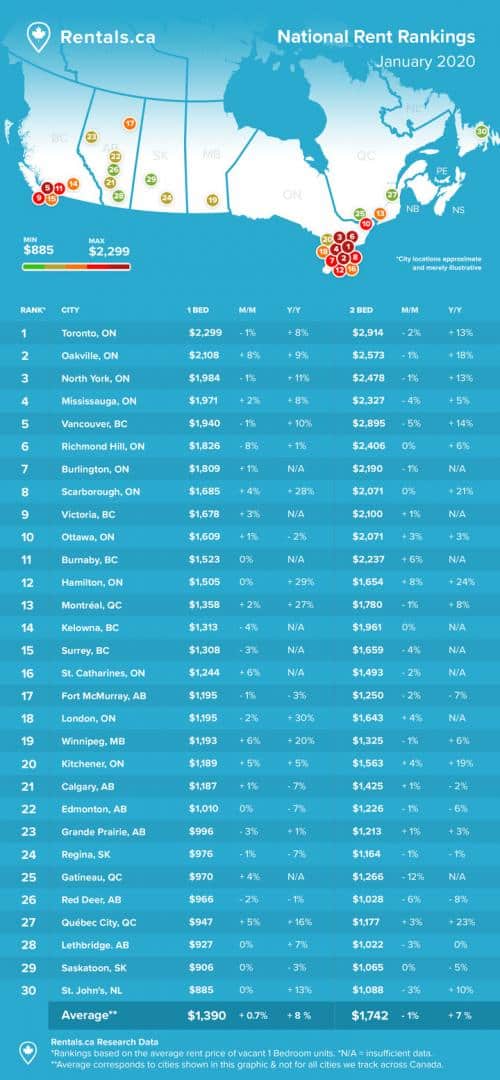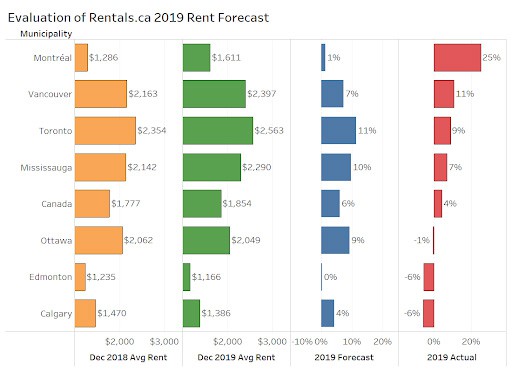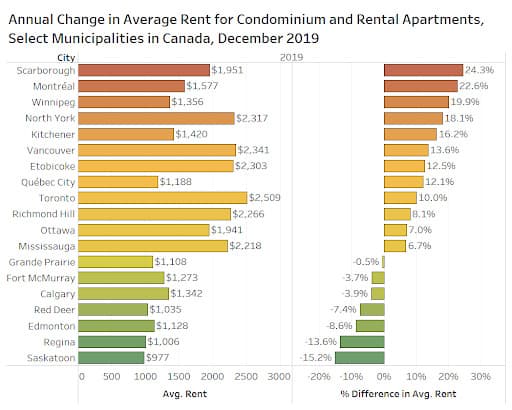Mississauga one of the top 10 priciest cities for renters
Published February 3, 2020 at 9:04 pm

The lack of affordable housing (for both renters and prospective owners) in Mississauga is starting to make headlines again as we kick off 2020 with a tight market marked by high demand and low inventory.
According to the January National Rent Report from Rentals.ca and Bullpen Research & Consulting, the average monthly asking rent for Canada rose 4.3 per cent year over year at the end of December.
Not unexpectedly, the report says the country’s three largest cities experienced significant rent increases in 2019 for all property types listed on Rentals.ca: Toronto at 9 per cent; Montreal at 25 per cent and Vancouver at 11 per cent.
In the January report, Mississauga came in fourth for average monthly rent for a one-bedroom at $1,971 and sixth for average monthly rent for a two-bedroom at $2,327. Oakville finished second of 30 cities for highest average monthly rent for a one-bedroom home in December at $2,108 and third for average monthly rent for a two-bedroom at $2,573.
Rents increased 7 per cent in Mississauga in 2019. According to the January report, Mississauga one-bedroom apartments cost more than those found in Vancouver, Richmond Hill, Burlington, Scarborough, Ottawa, and Montreal.

The report says Burlington finished seventh for a one-bedroom at $1,809 and eighth for a two-bedroom at $2,190.
Toronto had the priciest average monthly rent of the 30 cities on the list for a one-bedroom home last month at $2,299 and for a two-bedroom at $2,914.
As for what’s driving prices in urban cities such as Toronto, Vancouver and Montreal, the report says that young tenants are looking for walkable downtown communities where they can live without the expense of owning and parking a car.
Because the units are expensive, young professionals are squeezing into smaller units and living with roommates well into their 30s.

Unfortunately for tenants, the report suggests rental affordability is expected to get worse in 2020 in Ontario and British Columbia, despite an increase in new rental apartment construction, and the crackdown on empty units and Airbnb in several markets.
Rentals.ca’s recent 2020 Rental Market Predictions report, forecasts Canada’s average rental rates will increase 3 per cent year over year.
According to the report, eight of the top 10 most expensive cities for renters searching for a one-bedroom home are in Ontario.
On a provincial level, Ontario had the highest rental rates in the fourth quarter of 2019, with landlords seeking $2,318 per month on average for all property types. Ontario also has the highest share of condominium apartment listings at 37 per cent of the provincial total.

British Columbia had the second-highest rental rate at $1,928 per month, while Newfoundland and Labrador had the lowest at $954, the report says.
While the growing cost of housing has a lot of people renting for longer than they normally would, the report points out that a lot of residents are renting not because they have to, but because they want to.
“Many Canadians both young and old are choosing to rent for lifestyle reasons,” says Ben Myers, president of Bullpen Research & Consulting.
“Evan Siddall, president and chief executive of Canada Mortgage and Housing Corporation, recently said that the glorification of homeownership is counterproductive economically and socially. Developers across the country are recognizing this shift in mentality away from homeownership, as the number of rental apartment starts topped 54,000 in Canada in 2019, marking the 10th consecutive year of rising new construction activity.”
The increase in demand–especially for affordable apartments–has made it more difficult for tenants to enter the rental market.
“A logjam of tenants is clogging the bottom of the market,” says Matt Danison, CEO of Rentals.ca
“They are seeking the least expensive properties, often far from transit and their jobs. For example, growth in rental rates in Scarborough, North York and Etobicoke topped growth in the former City of Toronto as tenants search for cheaper apartments outside the downtown core. We will continue to see more renters extending beyond the GTA to commuter cities such as Hamilton.”
The National Rent Report charts and analyzes monthly, quarterly and annual rates and trends in the rental market on a national, provincial, and municipal level across all listings on Rentals.ca for Canada.
INsauga's Editorial Standards and Policies